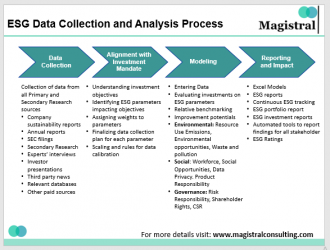ESG investing is changing the approach to capital allocation by investors, with increasing focus on sustainability, ethics, and long-term value creation. Through the incorporation of environmental, social, and governance factors into investment decisions. Asset managers are in a better place to assess risks, identify opportunities, and match portfolios with global sustainability objectives. The ESG investing industry itself is on a robust growth path, expected to reach around USD 167.49 trillion by 2034, growing at a CAGR of 28.20% during the period between 2025 and 2034.

ESG Investing Market Projections and Segment Insights
In addition to analytics, AI is revolutionizing ESG reporting, compliance, and risk reduction. AI-powered platforms enable automated aggregation of ESG data, real-time scoring, and greenwashing detection. It is along with transparency and accuracy of disclosures. Large financial institutions such as Citigroup and Goldman Sachs are taking a stake in AI-based ESG initiatives. This indicates the pivotal role of AI in sustainable investment goals. There are increasing regulations around ESG and investor pressure for sustainable data validity. So the use of AI tools enables finance professionals not only to comply with the requirements but also to outcompete their peers in ESG-related investment strategies.
How AI Enhances ESG Data Analysis and Portfolio Management
AI in ESG investing is transforming ESG data analysis and portfolio management. It is by going beyond lagging metrics to forward-looking, real-time intelligence. With sophisticated analytics, institutions can simulate how climate risks, regulatory changes, or social controversies impact asset values and sector performance. Natural Language Processing (NLP) enables the extraction of ESG signals from diverse sources. This includes annual reports, regulatory filings, news, and social media, resulting in more dynamic and consistent ESG scores.
At the portfolio level, AI-driven scenario modeling helps executives project the impact of varying climate and policy scenarios. It can thereby help in maximizing allocations to reconcile sustainability with returns. Early adopters of these technologies indicate greater alignment with compliance but also quantifiable enhancements. These areas include risk-adjusted performance, positioning AI as a strategic enabler in sustainable finance.
Predictive Analytics for ESG Risks
Predictive analytics in ESG investing is increasingly becoming a boardroom priority. It is because institutions try to measure risks that conventional models tend to miss. MSCI estimates that firms with solid ESG performance exhibit 10–15% lower cost of capital. They are thus considerably more resilient in terms of weathering downturns in the market. As AI in ESG investing is increasing, the predictive models consume climate data, regulatory reports, and supply chain exposures. It is to predict how disruptions like a 2°C increase in global temperature or new EU carbon pricing regulations might affect asset valuations.
An S&P Global study discovered that climate risks alone could wipe out as much as USD 4.2 trillion of global equity value by 2030. This highlights the financial implications of climate risks. Portfolio managers can use AI to detect these exposures in advance, stress-test portfolios across various scenarios. Thus they can actively reposition capital. Institutions that utilize predictive ESG analytics have achieved 2–3% gains in risk-adjusted returns. This confirms the value of AI as a strategic weapon for sustainable performance.
Unstructured Data Analysis and ESG Scoring
Perhaps the most revolutionary use of AI in ESG investing lies in its capacity to derive insights from unstructured data sources. More than 80% of information related to ESG lies outside structured financial disclosures. It is scattered across sustainability reports, NGO reports, government filings, media reports, and even social media sentiment. Natural Language Processing (NLP) algorithms are capable of reading millions of documents daily. They pick up on ESG controversies, labor issues, or governance shortcomings in real-time.
For instance, a Refinitiv study identified that ESG controversies identified via unstructured data analysis resulted in an average loss of 12% in stock value over 90 days, which indicates the financial materiality of such signals. By translating this unstructured data into quantitative ESG scores, AI allows portfolio managers to respond rapidly. This helps in offsetting risk exposures ahead of their crystallization as financial losses.
Scenario Planning and Portfolio Optimization
The use of AI in ESG investing in scenario planning enables financial institutions to experiment with how portfolios react under various regulatory, environmental, and social scenarios. Technologies such as climate scenario modeling have indicated that an orderly transition to net zero will destroy 15–20% of portfolio value in carbon-intensive industries, whereas ahead-of-the-curve alignment can release significant upside potential in renewable energy and green infrastructure.
As the Network for Greening the Financial System (NGFS) says, more than 70% of central banks currently employ climate stress testing. This highlights the significance of these instruments in financial regulation. By integrating AI-based simulations into portfolio optimization, institutions can rebalance exposures. They can also optimize diversification, and find a balance between sustainability and profitability, further supporting the role of AI in ESG investing. Early movers, such as major European asset owners, indicate that climate scenario-aligned portfolios realized 3–5% higher long-term Sharpe ratios, demonstrating the financial benefit of scenario-based investment strategy.
Navigating the New Regulatory Landscape with AI-Driven ESG Insights
The ESG regulatory environment is becoming more stringent at a speed that directly affects capital markets. AI in ESG investing is becoming an essential tool for keeping institutions in front of the curve. The EU’s Corporate Sustainability Reporting Directive (CSRD) will extend mandatory ESG disclosures to over 50,000 companies by 2026. It is in line with the SEC’s proposed climate disclosure rules set to impact over 90% of U.S. public companies. Non-compliance is no longer a matter of reputation only; PwC studies put the cost at an estimated USD 120 billion per year in regulatory missteps at ESG reporting. It is for global financial institutions in terms of penalties, litigation exposure, and divestment forces.
AI platforms solve the problem by scanning regulatory developments on an ongoing basis. It is across jurisdictions, aligning them with institutional portfolios, and alerting to exposure gaps in real time. For executives, this turns ESG compliance into a proactive strength from a reactive requirement. This allows institutions not only to keep up with global standards but also to become leaders in responsible, transparent finance.
Global Outlook on AI in ESG Investing
The international outlook for AI in ESG investing indicates quick acceleration as technology and sustainability intersect to transform financial markets. As the AI in ESG and sustainability market is expected to grow to USD 14.87 billion by 2034 at a CAGR of 28.2%, adoption is undergoing a transformation from compliance-driven pilots to enterprise approaches among banks, asset managers, and institutional investors. Increased regulatory requirements, investor expectations for transparency, and financial materiality of climate and governance risks are forcing chief executives to integrate AI into ESG systems. In the next ten years, AI will become not just a tool for reporting and surveillance but a strategic force behind capital allocation, portfolio resilience, and competitive differentiation in sustainable finance.

The Future of AI in ESG Investing
For decision-makers, the value lies in AI’s ability to translate complex ESG data into forward-looking, investment-grade intelligence. Studies suggest that firms leveraging AI-enabled ESG analytics have achieved 2–3% higher risk-adjusted returns and 10–15% lower costs of capital, underscoring tangible financial upside. Executives who integrate AI in ESG investing for portfolio optimization and scenario planning are not only mitigating regulatory and reputational risks but also positioning their institutions at the forefront of profitable, sustainable capital markets transformation.
Magistral’s Services for ESG
Magistral provides end-to-end ESG outsourcing solutions for institutional investors, asset managers, and financial institutions. These firms are looking to enhance their sustainable finance initiatives. Their services include ESG data aggregation, AI-powered analysis, and unstructured data processing. It allows clients to derive precise ESG scores and actionable intelligence. By harmonizing with international rules like the EU’s CSRD, SFDR, and the SEC’s pending disclosure requirements. Magistral provides compliance-ready ESG reporting that satisfies regulators and investors. Magistral’s AI in ESG investing research support allows decision-makers to detect climate, social, and governance risks. It can be done at an early stage, detect growth opportunities in green assets, and maximize portfolios for long-term yields. With its combination of industry knowledge, mass-market implementation, and sustainable finance offerings. Magistral becomes a go-to partner for high-level management intent on turning ESG from a compliance imperative into a source of competitive edge.
About Magistral Consulting
Magistral Consulting has helped multiple funds and companies in outsourcing operations activities. It has service offerings for Private Equity, Venture Capital, Family Offices, Investment Banks, Asset Managers, Hedge Funds, Financial Consultants, Real Estate, REITs, RE funds, Corporates, and Portfolio companies. Its functional expertise is around Deal origination, Deal Execution, Due Diligence, Financial Modelling, Portfolio Management, and Equity Research
For setting up an appointment with a Magistral representative visit www.magistralconsulting.com/contact
About the Author

Dhanita is a BD and Marketing professional with 6+ years’ experience in sales strategy, growth execution, and client acquisition; credentials include Stanford Seed (Stanford GSB), an MBA from USMS–GGSIPU, and a B.Com (Hons) from the University of Delhi. Expertise spans market research and opportunity mapping, sales strategy, CRM, brand positioning, integrated campaigns, content development, lead generation, and analytics; currently oversees business development calls and end-to-end marketing operations


